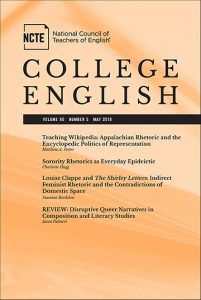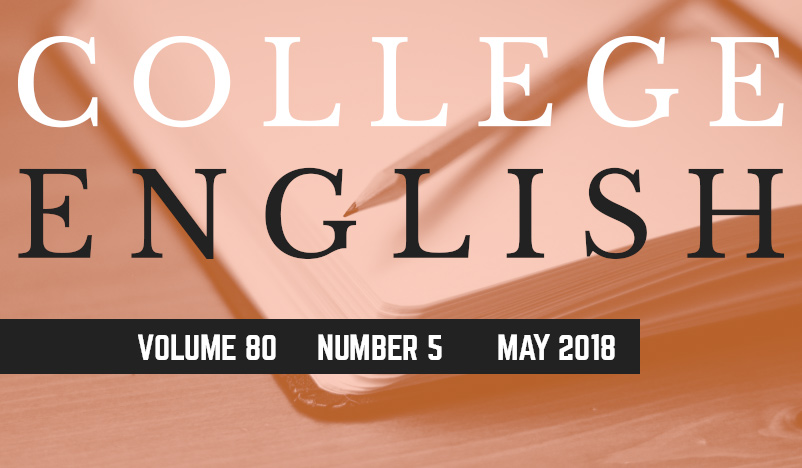This sneak peek comes courtesy of Melissa Ianetta’s “From the Editor” column in the May 2018 issue of College English.
 Even as the May issue is in your hands—or on your computer screen—we’re finalizing the July issue, which will complete my first official year as editor. As I look back, I note that the learning curve has been steep and the satisfactions have been immense. Thanks to the authors, reviewers, and members of the editorial board who have made these first issues possible.
Even as the May issue is in your hands—or on your computer screen—we’re finalizing the July issue, which will complete my first official year as editor. As I look back, I note that the learning curve has been steep and the satisfactions have been immense. Thanks to the authors, reviewers, and members of the editorial board who have made these first issues possible.
However, the purpose of this note is to look forward, not back, and to share with you future opportunities from College English. More particularly, I’d like to draw your attention to the calls for proposals for upcoming themed and special issues of the journal. I’m excited to announce our first themed issue: “Scholarly Editing: History, Performance, Future,” which will be composed of works that examine the role of the editor and the impact of editorial work. You can read a full call, including details of the submission and review process, in the announcement section at the end of this issue.
You will also find there a call for special issue proposals, to be submitted by July 15. I am asking members of the board to provide evaluative opinions of both sets of proposals, thus broadening the perspectives that review these issues.
I encourage you to read these calls—and to submit your best ideas pitched to the intellectual diversity that comprises our board. Any questions on these issues can be shared with me at collegeenglishjournal@gmail.com.
And now, to move from the future to the present and the richness of this number’s offerings, you will find much to inspire thinking about our discipline.
In “Teaching Wikipedia: Appalachian Rhetoric and the Encyclopedic Politics of Representation,” Matthew A. Vetter offers an engaging exploration of Wikipedia in terms of the ways in which it circulates representation and the pedagogical possibilities offered by its conferral of identity. In “Sorority Rhetorics as Everyday Epideictic,” Charlotte Hogg helps us understand how sororities position prospective members within their ideological traditions, arguing for the ways such occasions of the “everyday epideictic” invites rhetorical analysis. Suzanne Bordelon, in “Louise Clappe and The Shirley Letters: Indirect Feminist Rhetoric and the Contradictions of Domestic Space,” examines a different kind of rhetorical space in a project serendipitously complementary to Hogg’s. Finally, Jason Palmeri’s review, “Disruptive Queer Narratives in Composition and Literacy Studies,” weaves together personal narrative with insightful review of three recent texts.
I hope you enjoy reading this issue as much as we in the field office at University of Delaware have. Right now, we see much to enjoy—and much to look forward to!

Melissa Ianetta is the Unidel Andrew B. Kirkpatrick Jr. Chair of Writing and Rhetoric and director of the Writing Center at the University of Delaware, and is editor of College English.
Interested in reading more? Subscribe!

